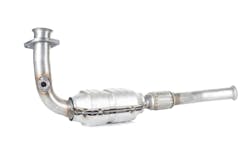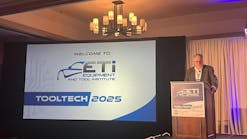Rise in catalytic converter thefts sparks state and federal legislation
Content brought to you by Motor Age. To subscribe, click here.
What you will learn:
• Expensive precious metals are the root cause of catalytic converter theft
• Rhodium costs more than $18,000 per ounce
• Identification markers are being implemented to prevent the theft of catalytic converters
During the pandemic, the United States saw a sharp increase in crime, particularly in large metropolitan areas. In 2020, a total of 880,595 vehicles were reported stolen, a 10.9 percent increase from 2019. Additionally, according to the National Insurance Crime Bureau (NICB), thefts of catalytic converters increased 325 percent between 2019 and 2020. Thefts of catalytic converters continued to skyrocket in 2021 and into this year.
A catalytic converter is an exhaust system part that is necessary for vehicles to pass emissions and safety inspections in many states. Without a catalytic converter, a vehicle will generally continue to function. However, it will emit a loud, telltale exhaust roar.
Catalytic converters make perfect targets for criminals because they are easy to access, and removal requires only a few handheld tools. Additionally, catalytic converters are extremely lucrative for criminals to resell to a metal recycler due to the small amounts of precious metals found inside.
Catalytic converters use very small amounts of platinum, palladium, and rhodium to function. Thefts of catalytic converters have continued to increase due to the increase in the resale value of these precious metals. Platinum is currently valued at $977 an ounce, palladium is currently more valuable than gold, at $2,309 an ounce, and rhodium is the most valuable of all, at $18,300 an ounce. Although catalytic converters contain only minuscule amounts of these rare metals, thieves can resell a converter for up to $1,000 each.
For consumers, catalytic converter thefts come at a significant cost. Often, when the thief attempts to remove the converter, the surrounding exhaust system and other vehicle functions are damaged as well. Replacing and repairing these damages can cost thousands of dollars. Some vehicles have been reported as being more vulnerable to catalytic converter theft. Cars or trucks with a high clearance means easier access to the underside of the vehicle, and some larger vehicles can have up to four catalytic converters apiece.
Many states have passed or introduced legislation aimed at curbing catalytic converter theft. In many states, such as Virginia, legislation would increase the severity of the punishment for tampering with or stealing a catalytic converter by changing it from a misdemeanor to a felony. In Colorado, legislation would require a record of the sale, transfer, purchase, or receipt of catalytic converters and would create a grant program to fund public awareness campaigns regarding converter tracking efforts and theft prevention.
This year alone, ten bills have been introduced in the California legislature aimed at reducing catalytic converter theft. Two of the bills, AB 2682, and SB 919, would require that the vehicle’s VIN be etched on the catalytic converter before it is allowed to be sold at a dealership. This measure would allow detached catalytic converters to be more easily traced in the event they are stolen.
Last year, Oregon passed SB 803, which works to stop catalytic converter thefts by limiting which metal recyclers can buy them, creating a barrier for people selling on the black market. The legislation ensures that scrap metal businesses only receive catalytic converters from licensed commercial sellers and requires these businesses to keep records on the make, model year, VIN, and license number associated with the converters. This legislation went into effect on January 1, 2022.
The rise in catalytic converter theft has also caught the attention of federal lawmakers. In January 2022, U.S. Representative Jim Baird (R-IN) introduced HR 6394, the “Prevent Auto Recycling Theft Act” or “PART Act.” This legislation aims to reduce catalytic converter theft by marking identifying information, such as VIN, on the converters, addressing how the parts are purchased, and strengthening enforceability of catalytic converter theft for local lawmakers. The Automotive Service Association supports HR 6394.
The PART Act has 10 bipartisan cosponsors and has been referred to the U.S. House Committee on Energy and Commerce Subcommittee on Highways and Transit but has not been scheduled for a hearing to date.



